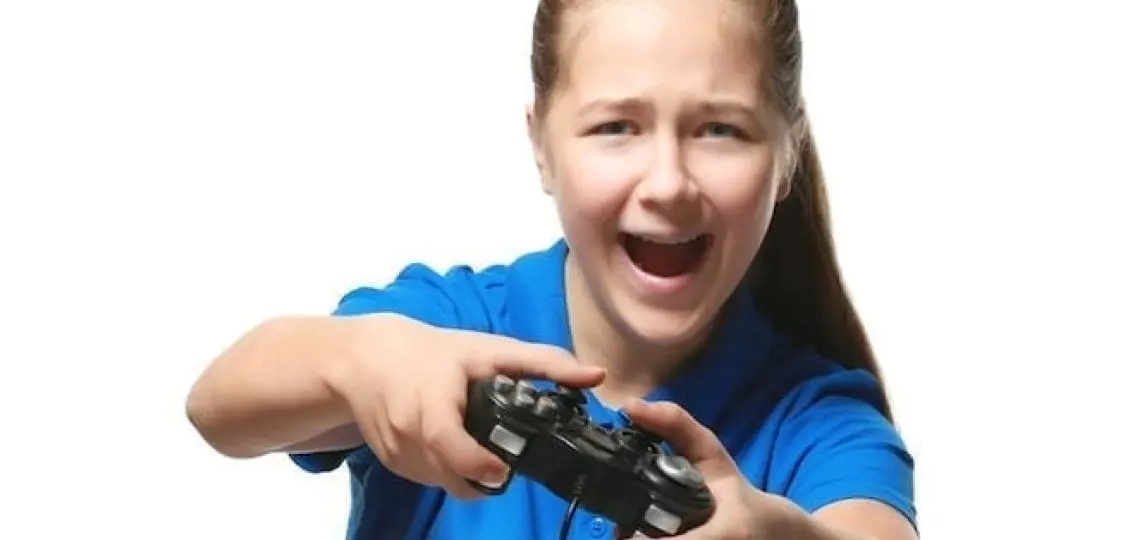“Get back in the kitchen.”
“Go make me a sandwich.”

These are some of the more PG-rated sexist comments that Malory Fox of Cincinnati hears when she’s playing an online multiplayer video game. She’s not alone.
Talk To Boys And Girls About Game Sexism Online
“The industry was long structured as a kind of ‘boys club,’ and those ideologies are often reinforced still,” says Shira Chess, author of Ready Player Two: Women Gamers & Designed Identity.
Traditionally, gamers had two options: Play a friend or play the computer. The internet has added a third: Play online with strangers.
That can sound scary to parents, but it’s not all bad news. “The beautiful thing about gaming these days is that it is so accessible for so many people,” says Jenny Haniver, the founder of the website Not in the Kitchen Anymore: Chronicles of a Female Gamer. With games on our phones, computers, and TVs, there really is something for everyone, she says.
Chess agrees that gaming can be a positive experience, and she reassures worried parents that video games are not necessarily “toxic spaces.”
Seeing Sexism In Online Gaming
In a way, online gaming is an extension of social media, with both text and voice chats. Like any conversation, these gaming chats can be harmless or hurtful. But online chats don’t contain the social cues that tend to keep face-to-face interactions more civil.
Players can “friend” other players within each game and choose to play with them again. But many times, a player jumps online and joins a game spontaneously—and in this case, harassment is more common because of the lack of ongoing community accountability.
Some game genres tend to foster more sexist barbs. In shooter games, for example, the objective is to dominate and survive—a stereotypically “masculine” arena. This type of game tends to exist in extreme environments like war or apocalypse, and to include overly sexualized female characters. Fox says if her character takes a kneeling stance for combat she’s likely to hear, “She’s on her knees again!”
In online games, players are embedded in a fantasy world. All a player sees about the other players is a gamertag, an avatar, and a character—and they may hear the sound of their voice in their headset. As Haniver says, “You can lose sight of the other player’s humanity, making it easier to say things you wouldn’t say to someone face-to-face.”
Dealing With Online Harassment
Nevertheless, it is important that teens are comfortable talking to parents without the threat of the game necessarily being taken away. “There are a lot of beautiful, developed, complex stories that are increasingly being told via video games. Parents should not deny their kids the opportunity to play through these stories, simply out of fear of sexism,” says Chess.
In many cases, there are steps parents can take to mentor their teens through these situations without imposing an outright ban on gaming.
“It is a small minority of people who act inappropriately,” stresses Haniver, and players have resources when they do. Players can:
- Mute an individual player in the game’s chat function.
- Block another player from messaging them in the game.
- Mute the entire chat.
- Report another player.
Parents of both boys and girls can also play an important role in setting standards for appropriate gaming behavior—and enforcing these expectations.
Smack talk—teasing in the spirit of competition—is expected to an extent. However, when it crosses the line to attack someone’s gender, race, or sexuality, it becomes harassment.
“It is a game and it’s meant to be fun,” says Haniver. “The minute you begin harassing a fellow gamer, something has gone horribly wrong.”
Chess is optimistic about the future of gaming for women. “Things are changing,” she says, “The more that young women get involved in console gaming, the more it dilutes the sexism. Increasingly, there are a lot of gamer girls, and that gives me hope.”
Basic Video Gaming Safety
Parents should also remind their teens about protecting their identity:
- Don’t use your real name or an approximation of your real name as your gamertag (player handle).
- Don’t put your exact location in your bio. Say “United States” or “Kansas”—not “Highlands High School, KY—Go Blue Birds!”
- Don’t talk about personal identifiers, such as email addresses, phone numbers, or birthdates in party chat.
- Don’t use a photo of yourself in your profile. Use an avatar (cartoon creation) or other image.
- Don’t use a gamertag that is the same as or is similar to your Twitter or Instagram handle.




